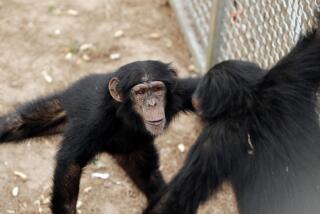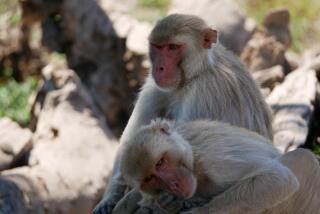But do they all think they’re fat?
Cats may try to pick a fight with their image in a mirror. Dogs may bring a gift of food to what they think is a newfound friend. But humans and chimpanzees -- and maybe dolphins -- have long been thought to be the only species that primp and groom before the mirror because they recognize themselves.
Now elephants can be added to the list, researchers from the Yerkes National Primate Research Center and the Wildlife Conservation Society reported Monday in the online version of the Proceedings of the National Academy of Sciences.
Three female elephants at the Bronx Zoo in New York examined the insides of their mouths, studied their ears and showed other signs of self-awareness, said Yerkes graduate student Joshua M. Plotnik, a co-author along with Frans B. M. de Waal of Yerkes and Diana Reiss of the Wildlife Conservation Society.
Most important, one of the elephants, Happy, used her trunk to touch a mark on her head that she could see only in the mirror -- a standard test of self-awareness developed 35 years ago by biologist Gordon R. Gallup Jr.
The experiment provided “compelling” evidence that the animals have a strong sense of self, said Gallup, who was not involved in the research.
That self-recognition may be the basis for the social complexity previously observed in elephants, and may be linked to the empathy and altruism the large-brained animals are known to display.
Previous experiments had failed to produce such recognition, but they used small mirrors out of the animals’ reach. The new study used an 8-foot-by-8-foot “elephant proof” mirror made of plastic framed in steel.
The animals initially tried to look behind the mirror, swinging their trunks over the mirror and wall, kneeling in front to look under it, and even attempting to climb the wall holding the mirror. Such behavior is typical for self-aware animals, De Waal said.
As a result of this study, he added, “the elephant now joins the cognitive elite.”
*





